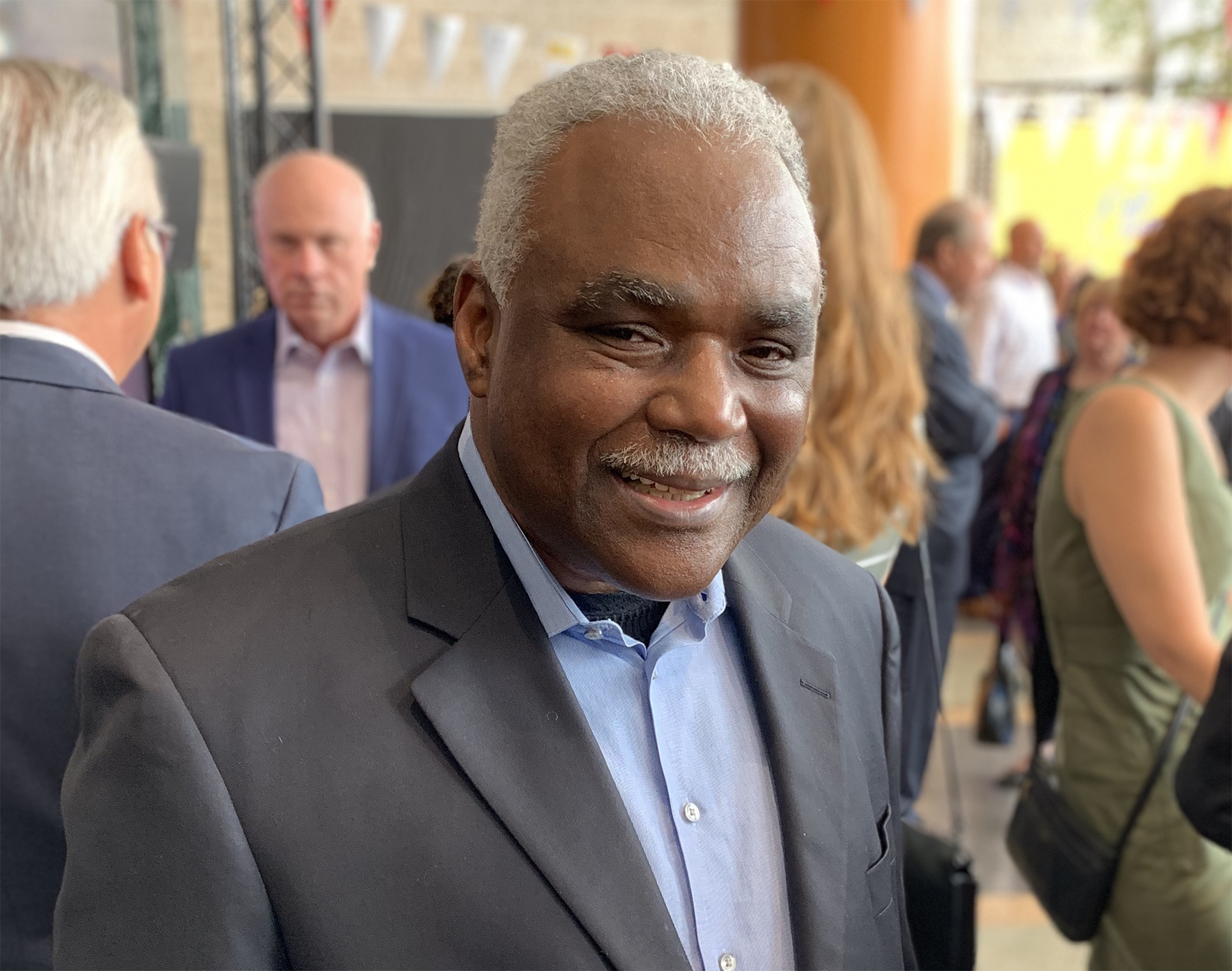Dr. Gregory Motayne, a forensic psychiatrist at The Royal whose career has a special focus on adolescents, recently had his name added to the Wall of Inspiration at Ottawa City Hall for his volunteer work with Youturn – Youth Support Services (Youturn), a local organization that provides specialized services for youth in the justice system.
Motayne, who was honoured with a Community Builder Award from United Way East Ontario in September 2018, was one of the community builders who had their names inscribed on the wall. It was unveiled on September 24, 2019 at an event called “This is Ottawa” hosted by United Way.
The event was co-emceed by Stefan Keyes of CTV News Ottawa, which had special meaning as it was Keyes who presented a very surprised Motayne with his Community Builder Award at the Youturn Annual General Meeting (AGM) back in September 2018.
Helping young people turn their lives around
Youturn is a non-profit organization that provides counselling, education, training, clinical treatment, and a range of other resources and support to youth in conflict with the law and their families.
At the “This is Ottawa” event, Keyes fondly recalled the day he first presented Motayne with the Community Builder Award. “It was an incredible honour, just knowing the calibre of his work and his commitment to the community and organizations like Youturn,” reflected Keyes. “Seeing that smile on his face and surprising him like that brought such a joy to everyone.”
Motayne volunteered with Youturn for close to a decade, starting in 2007 when it was called the Eastern Ontario Youth Justice Agency. He eventually became the chair of the board, a position which he held for three years. He had previously been the President of the Board of Directors of Project Upstream and helped with the establishment of their youth program in 2008.
Although he’s no longer on the board of Youturn, Motayne continues to provide psychiatric consultation services for several youth-related organizations, including the Roberts/Smart Centre (a children’s mental health centre that delivers specialized treatment for youth living with complex behavioural and emotional needs), the Youth Services Bureau, and the Youth Mental Health Court.
Kathy Neff, the former executive director of both Youturn and the Roberts/Smart Centre, nominated Motayne for the award.
Neff first got to know Motayne while she became the executive director of Youturn and he was already on the board. She credits him for “bringing a role of professionalism” to the board and helping develop a long-term vision for the organization, especially while he was the chair of its Board.
Neff says that during his term as chair of Youturn, they expanded the number of clients they served and the number of programs that they offered in Ottawa and beyond.
“He’s a huge champion for individual youths,” says Neff. “He’s like this amazing gift that we have in Eastern Ontario, he’s just so smart and so wise, and so committed to these kids.”
It could be said that Motayne’s interest in helping at-risk youth has its roots in something he did as a medical student years ago. While he was on call – but not too busy – he enjoyed helping the night nurses with infants in intensive care.
“The nurses were very busy and they could not spend a lot of time with the young infants who were crying,” he recalls. “Sometimes the kids just need to be picked up and held.”
He later had a “brief stint” in pediatrics before getting into psychiatry. The trajectory of his career took a decisive turn toward at-risk youth when he arrived at The Royal 29 years ago. Today, his work includes preparing court-ordered assessments of youth charged with criminal offences.
Congratulations to Dr. Gregory Motayne! He received a Community Builder Award from @UnitedWayEO and today we are at the unveiling of the Wall of Inspiration, where his name is inscribed along with over 850 other amazing Ottawa citizens. #locallove #ottawa pic.twitter.com/VvzhEuQG9D
— The Royal Mental Health Centre (@TheRoyalMHC) September 24, 2019
“When a youth gets into trouble with the law, a court is usually interested in the underlying motivations for the behaviour, the experiences the young person has had, any kind of behavioural, mental health issues, family issues, and other related issues that may have contributed to the reason why they got into trouble with the law,” explains Motayne. “My role was really to use my psychiatric expertise to help the court understand the underlying factors that fuelled some of the behaviours that caused the youth to be in conflict with the law.”
The findings and recommendations of the court-ordered assessment also help to inform for the Court about the mental health issues that may be relevant to the youth’s functioning and disposition decision-making, the youth’s risk for recidivism and possible responses to treatment. “It’s also very important for us to be able to identify the strengths of the youth, and the kinds of approaches that could be used to capitalize on their strengths.”
Advice for others working with youth
Motayne’s own philosophy can be boiled down to two words: listen actively. “The youth have a lot to say if you give them the opportunity to speak, and if you let them know that you’re listening,” he says. What’s more, sometimes refraining from the temptation to give advice and simply allowing young people to work though problems can help turn things around.
Motayne says he’s learned a lot from the young people who have crossed his path. He’s grateful for the many insights they have shared with him over the years and their boundless capacity to reflect, be intuitive, and figure things out.
And this is where Motayne’s story comes full circle, right back to those nights spent in the intensive care ward with infants who desperately needed some extra affection. It’s a good reminder that everyone needs love and support to help their recovery, even if they’re too big to be cradled in our arms.
